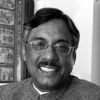One should never underestimate the clash of culture and status in politics. One such person, whose career symbolised this gulf, was Shrikant Verma, a great Hindi poet, one of the pioneers of new Hindi kavya, and a powerful politician, whom I had the privilege to know closely in the 1980s, and whose wife, Veena, passed away last week.
Shrikant was born in Bilaspur, now in Chhattisgarh, in 1931, a product of a Hindi medium municipal school. Starting as a schoolteacher, he moved to journalism and became an influential reporter for the Hindi weekly, Dinaman.
He was active in Congress politics, close to Indira Gandhi, and in 1969 was appointed general secretary of the party. In 1976 and 1982, he was elected to the Rajya Sabha. After Sanjay Gandhi’s untimely death, he joined the office of the new heir apparent, Rajiv Gandhi. When Rajiv became prime minister, after Indira’s tragic assassination in 1984, Shrikant was at the zenith of his power.
Shrikant and I became good friends through the literary network. One evening, as we were having a drink at his Lutyens home, we heard the screeching tyres of a car literally zooming into his porch. Elections had been announced, and Rajiv was the new political superstar. A certain gentleman, still around (but whom I will not name), who had parachuted into Rajiv’s coterie without any experience of politics, entered the house. Brusquely he asked Shrikant: “Have you drafted the slogan?”
The slogan, in Hindi, was brilliant: “Chunauti nayi, naya sandesh, sabal hai haath, akhand hai desh” (The challenge is new, so is the message; the hand is strong, the nation is indivisible). In just two lines, it said it all: The new challenge was Indira’s assassination, young Rajiv was the new message, the hand (the Congress party’s symbol) was strong, and the nation was united.
But the arrogant Doon school pal of Rajiv protested. “Who can understand the word sabal?” he said aggressively. “Change it to mazboot (strong),” he instructed. Shrikant refused. He said that a slogan must have a rhyme and metre, and the word “mazboot” breaks it. But the gentleman was insistent.
Shrikant was by now two drinks down. A highly respected poet, and a seasoned politician, he was in no mood to take this rudeness. And that is where he made his political mistake. “Bhai saheb,” he said, “Bharat mein sab log Doon school nahin gayen hain ki unko ek simple Hindi word samajh nahin aayega” (Listen, not everyone in India has studied in Doon school that they cannot understand a simple Hindi word). Outraged, the gentleman stormed out.
The message must have been conveyed to Rajiv immediately, and Shrikant soon knew it had. When Rajiv won his stunning victory in the 1984 national elections, Shrikant was in charge of the media campaign. People were sure that given his proximity to the new supremo, he would find a place in the cabinet. But his name was not there.
That evening, as the new cabinet was being sworn in, I got a call from him. “Could you come over if free?” he asked. I rushed to his house and found it deserted, when till the day before huge crowds milled around. He was having a drink alone, brooding and despondent, although I tried to cheer him up. In 1985, he was removed as general secretary of the party. Some months later, he was summoned by Arun Nehru who, while lying on the sofa, barked a one-liner to him: “You will no longer be a spokesperson.”
Soon thereafter, Shrikant had a heart attack. He had a bypass, but in 1986 died from cancer. Rajiv, a good man in the wrong company, sent him to New York for treatment, and being posted there, I was at his bedside when he passed away.
My own reading is that Shrikant, the sensitive Hindi poet, was unpalatable to the brash anglicised elite surrounding Rajiv. The lines from his famous poem, Havan, echo in my mind: “Chahta to bach sakta tha, magar kaise bach sakta tha, jo bachega, kaise rachega?” (If I had wanted, I could have saved myself; but if I had, how could I write?’).
Pavan K Varma is author, diplomat, and former Member of Parliament (Rajya Sabha). Just Like That is a weekly column where Varma shares nuggets from the world of history, culture, literature, and personal reminiscences with HT Premium readers. The views expressed are personal





















 Toi Staff
Toi Staff Gideon Levy
Gideon Levy Belen Fernandez
Belen Fernandez Andrew Mitrovica
Andrew Mitrovica Mort Laitner
Mort Laitner Rami G Khouri
Rami G Khouri Ali Fathollah-Nejad
Ali Fathollah-Nejad Nikkei Editorial
Nikkei Editorial
